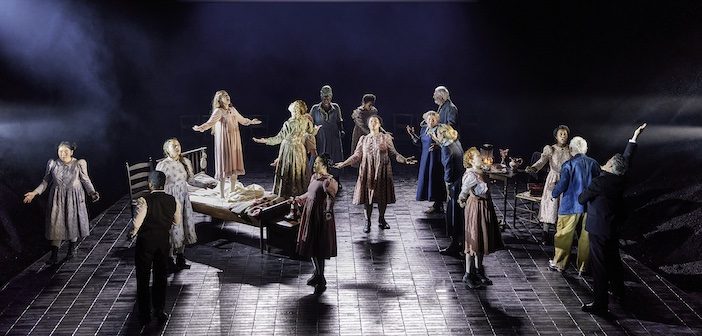Lyndsey Turner directs an impressive revival of Salem’s unnerving story, Alice Payne reviews…
The stage opens onto Salem as pious church music fills the air. Its parishioners sit obediently in pews, their backs to the audience, their faces towards the formidable Reverend Parris who delivers a hellfire sermon. So far so Puritan. In the back row, however, two girls pinch each other in a surreptitious moment of levity. But their playful act is seen by Parris who strides furiously towards them and inflicts violent punishment on Abigail, his niece, dragging her from her seat. Shock silences the room and the church’s illusion of harmony is shattered. The stage clears, but the sense of Salem’s oppressive theocracy lingers, setting the scene for this gripping, still-bewildering tale.
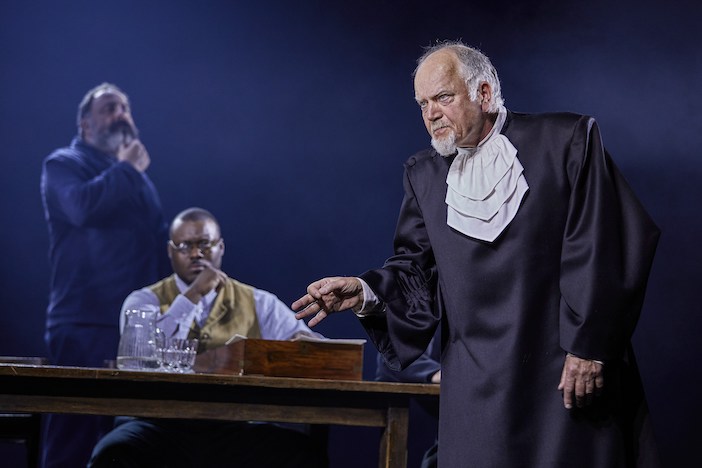
Watching Arthur Miller’s retelling of America’s most famous witch-hunt is as compelling as it is frustrating because of the absurdity of what unfolds; an absurdity that’s all the more unsettling for being true.
In the Massachusetts Bay Colony in 1692, 14 women, five men and two dogs were killed for the crime of witchcraft while hundreds more were accused and imprisoned as hysteria spread across the colony. What started with accusations by a group of girls in Salem spiraled into a multi-county persecution presided over by eminent judges whose machinery, once set in motion, proved near-impossible to stop.
Miller wrote The Crucible in 1953 in the midst of another persecution as Senator McCarthy’s ‘red hunt’ for communists permeated America, with particular focus on its arts. He described writing the play as an act of desperation driven by the paralysis of many liberals who, despite being uncomfortable with such civil rights violations, were fearful of being labelled communists if they protested. Finding echoes of the past in the present, Miller used Salem’s story to examine one miasma through the lens of another.
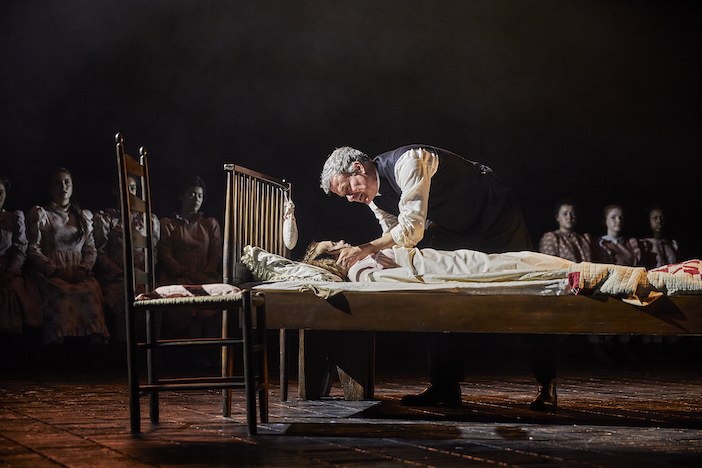
Directed by Lyndsey Turner, this latest production, which opened at the National Theatre in 2022 and moved to the Gielgud this summer, does a powerful job of conveying the fears, tensions and resentments that created the perfect maelstrom for Salem’s pandemonium to occur. After two girls fall unwell, the play’s 28 characters splinter in their belief as to whether witchcraft is afoot in the village, who’s to blame and how to handle it.
Their polarised views feel all too familiar in light of recent years, as reason and emotion hurdle each other towards an ominous finish line. Themes surface that have frayed societies throughout time, from fear of the unknown to the corrosive effect of inequality, the desire to find reason for individual suffering and the palliative balm of offloading blame onto someone else.
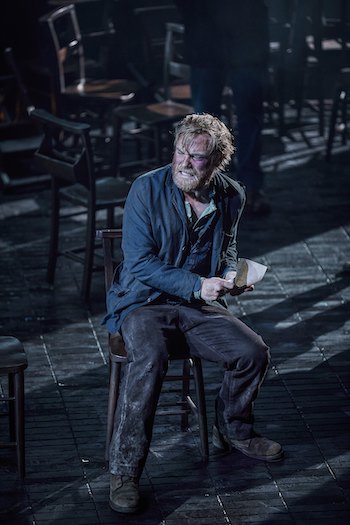 Brian Gleeson delivers a moving performance as John Proctor, a rare voice of sense whose internal battle to redeem himself from a past mistake delivers the moral spine of the story, while Karl Johnson as the aged, quarrelsome farmer Giles Corey gives a performance that lingers long after, with its touching moments of tragicomedy. The calm, selfless Elizabeth Proctor – who advocates free will despite the consequences – is played gracefully by Caitlin FitzGerald, while her charismatic antagonist, Abigail Williams, is performed by Milly Alcock with such compelling enigma that it’s hard to decide to what extent she is the perpetrator, victim, or both.
Brian Gleeson delivers a moving performance as John Proctor, a rare voice of sense whose internal battle to redeem himself from a past mistake delivers the moral spine of the story, while Karl Johnson as the aged, quarrelsome farmer Giles Corey gives a performance that lingers long after, with its touching moments of tragicomedy. The calm, selfless Elizabeth Proctor – who advocates free will despite the consequences – is played gracefully by Caitlin FitzGerald, while her charismatic antagonist, Abigail Williams, is performed by Milly Alcock with such compelling enigma that it’s hard to decide to what extent she is the perpetrator, victim, or both.
And then there’s Nia Towle as Mary Warren, one of the teenage accusers who at first succumbs to the intoxicating effect of power following her sudden elevation from a house servant to an official of the court, but whose later attempt to recalibrate her morals determines the course of events and delivers The Crucible’s gripping denouement.
Throughout, Turner’s staging heightens the drama. In particular, the sight of the petite Warren surrounded by 12 men – each demanding a truth that will suit their own cause – visibly frames the misogyny at the heart of witchcraft accusations – an indictment where the only course to freedom is an admission of guilt.
Despite its nearly three-hour running time, Turner manages to keep the play charged with emotion so that it captivates throughout. Although some lines now seem so absurd they elicit laughter, she draws on classic horror-film traits to generate a sense of terror, and when the accusers begin convulsing and screaming at visions, it’s easy to understand how the village’s panic set in.
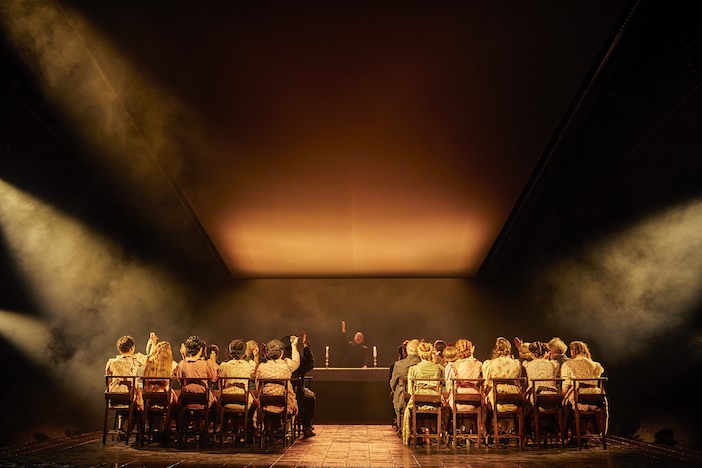
As the drama unfolds, the stage narrows and the scenes become more claustrophobic. The lighting shifts from a yellow glow in the Proctors’ home to a stark glare in the courtroom to a hopeless gloom in the final prison scene. In the darkness, its inhabitants have been stripped to their mettle and must choose between integrity and freedom.
Despite seventy years since its release, Miller’s lens still feels as pertinent today with its enduring warning of how power and fear can erode humanity. No doubt performances of The Crucible will continue providing reflection for generations to come. In the meantime, this latest revival carries the baton marvellously.
The Crucible runs at The Gielgud Theatre until 2nd September 2023. For tickets and more information, visit www.gielgudtheatre.co.uk.
Photos by Brinkhoff Moegenburg

